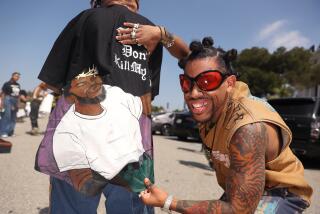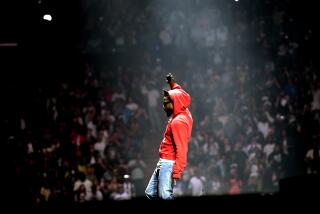Perspective: Remembering the 1972 Wattstax concert brings us to crucial voices of Kendrick Lamar, Prince
It was spoken of as sort of a black Woodstock. It featured artists like Isaac Hayes and the Staple Singers. And it was right here in L.A.
But judging by its absence in conversations about the â60s and â70s, few remember the 1972 Wattstax concert. It was an answer to the Watts riots of 1965; a chance to counter the destruction with a daylong celebration of black music and culture.
Now, on the 50th anniversary of the Watts riots, the concert is a powerful reminder of where L.A. was in those years directly preceding the uprising in which 34 people died, more than 1,000 were injured and property damage was estimated at $40 million.
For those who werenât born yet, the concert is chronicled in the 1973 documentary âWattstax.â In one particularly moving performance, the nearly 100,000 predominantly black concertgoers who packed the Los Angeles Memorial Coliseum had their fists raised in the air as soul singer Kim Weston sang âLift Evâry Voice and Sing,â a song thatâs spent nearly the last century as the black national anthem.
Westonâs searing take on the inspirational hymn captured the resilience that the concert aimed to celebrate: âSing a song full of the faith that the dark past has taught us / Sing a song full of the hope that the present has brought us / Facing the rising sun of our new day begun / Let us march on till victory is won,â she sang, with the crowd joining in unison.
Wattstax was sponsored by Stax Records, the Memphis label that was home to Otis Redding and the Emotions. Stax artists Hayes and the Staple Singers were featured on the bill along with nearly two dozen more acts from the label, including the Bar-Kays, Rufus Thomas and the Soul Children. The concert, officially called Wattstax 72, was organized as âa day of black awareness,â as Jessie Jackson said during his invocation.
The Watts riots erupted in August 1965 after a young black male was pulled over on suspicion of drunk driving. The routine arrest escalated into a violent confrontation. That night, 1,000 people rioted, some throwing bricks, rocks and bottles at police and motorists, The Times reported, and sparked six days of rioting.
âWe all got pissed and went out and burned up our neighborhood,â a man says in the film. âWe brought âthe manâ onto their own land. Thatâs the only way we could communicate.â
Fifty years later, weâre still witnessing these same scenes across the country.
The Watts uprising is just one of many entries in the long, complicated history of race relations in this country â each with its own soundtrack as black music continues to provide a crucial voice, particularly in times of protest.
Before Watts and beyond it, the tumult, rage, love and hope being felt in the black community seeped into the music coming from its artists.
âYou donât have to live next to me, just give me my equality,â Nina Simone sang on her controversial yet seminal anthem, âMississippi Goddam.â
James Brownâs âSay It Loud â Iâm Black and Iâm Proudâ unapologetically bursts with pride. Marvin Gayeâs seminal concept record âWhatâs Going Onâ was informed by the events in Watts.
N.W.A brazenly shouted âFâ tha Police,â lyrics that became a mantra when Los Angeles erupted in fiery riots and violence in the 1992 uprising that echoed the events of Watts from nearly three decades before. The recent blockbuster success of N.W.Aâs biopic, âStraight Outta Compton,â is proof of these themesâ timeliness.
Today a new generation of young black men and women are pushing back against social injustice. The deaths of unarmed blacks in Ferguson, Mo.; Baltimore; Cleveland; Staten Island; North Charleston, S.C.; Cincinnati; Waller County, Texas; and more have reignited the ongoing debate over the use of lethal force disproportionally against blacks by law enforcement.
On the surface, Jidennaâs âClassic Manâ is a gleeful club banger, but itâs also a rare celebration of black men. Compton rapper Kendrick Lamarâs empowering, post-depression joint, âAlright,â is emerging as a protest anthem. And Princeâs recently released single, âBaltimore,â is a beautiful call to the streets in the wake of officer-involved deaths of unarmed black people.
In the Wattstax documentary, images of black daily life â people smiling and dancing, getting their hair done, laughing with neighbors or going to work â are spliced against footage of the riots. People discussed their anger over police-involved shootings and feelings of disenfranchisement from city officials as scenes of the civil rights era flashed across the screen.
It was an attempt to show that, yes, life goes on, but that doesnât cover up the pains of the past. It also documented that the Wattstax concert was an ambitious undertaking, especially for the time.
With tickets priced at just $1 to ensure everyone could afford to come, it wasnât just a celebration of black music in the name of charity, it was a movement.
Todayâs festivals and concerts dedicated to black audiences almost certainly grew out of the experiment that was Wattstax. The Essence Fest and the BET Experience exclusively celebrate black music, both attracting hundreds of thousands of attendees annually.
At this yearâs BET Experience in June, a partially reunited N.W.A led the 20,000 concertgoers â of all races, mind you â inside Staples Center through a singalong of âFâ tha Policeâ as images of protest and police brutality (from old clips of Rodney King to fresh, social media-captured scenes) flashed on a video wall.
And when Lamar opened the BET Awards that same weekend, he stood atop a police car covered in graffiti under a waving, partially shredded American flag (recently seen at MOCA as the centerpiece of William Pope.Lâs âTrinketâ) as dancers moved triumphantly around him, appearing in protest of their surroundings. Fox News pundits ripped the performance, claiming it âincites violence,â but attendees of a Black Lives Matter conference at Cleveland State University turned to its chorus after a confrontation with police.
âWe gonâ be alright / Do you hear me, do you feel me/ We gonâ be alright,â the chorus goes. Hopefully one day it will ring true.
MORE:
Jason Derulo on his âThink You Can Danceâ gig: âItâll give people an idea of who I amâ
How Carly Rae Jepsen moved beyond âCall Me Maybeâ: âI wanted it so badlyâ
Big Sean has a surprising method for dealing with fame
More to Read
The biggest entertainment stories
Get our big stories about Hollywood, film, television, music, arts, culture and more right in your inbox as soon as they publish.
You may occasionally receive promotional content from the Los Angeles Times.











